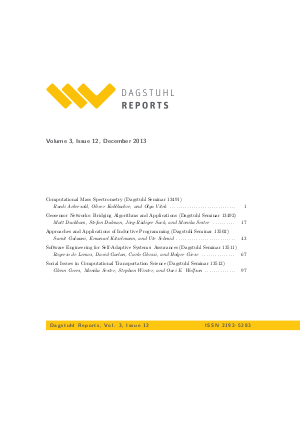Dagstuhl Reports, Volume 3, Issue 12
-
Part of:
Volume:
Dagstuhl Reports, Volume 3
Journal: Dagstuhl Reports (DagRep)

Event
- Dagstuhl Seminars 13491, 13492, 13502, 13511, 13512
Publication Details
- published at: 2014-03-31
- Publisher: Schloss Dagstuhl – Leibniz-Zentrum für Informatik
- DBLP: db/journals/dagstuhl-reports/dagstuhl-reports3
Access Numbers
- Detailed Access Statistics available here
-
Total Document Accesses (updated on a weekly basis):
0PDF Downloads
Documents
Dagstuhl Reports, Volume 3, Issue 12, December 2013, Complete Issue
Abstract
Cite as
Dagstuhl Reports, Volume 3, Issue 12, Schloss Dagstuhl – Leibniz-Zentrum für Informatik (2014)
Copy BibTex To Clipboard
@Article{DagRep.3.12,
title = {{Dagstuhl Reports, Volume 3, Issue 12, December 2013, Complete Issue}},
journal = {Dagstuhl Reports},
ISSN = {2192-5283},
year = {2014},
volume = {3},
number = {12},
publisher = {Schloss Dagstuhl -- Leibniz-Zentrum f{\"u}r Informatik},
address = {Dagstuhl, Germany},
URL = {https://drops.dagstuhl.de/entities/document/10.4230/DagRep.3.12},
URN = {urn:nbn:de:0030-drops-45148},
doi = {10.4230/DagRep.3.12},
annote = {Keywords: Dagstuhl Reports, Volume 3, Issue 12, December 2013, Complete Issue}
}
Dagstuhl Reports, Table of Contents, Volume 3, Issue 12, 2013
Abstract
Cite as
Dagstuhl Reports, Volume 3, Issue 12, pp. i-ii, Schloss Dagstuhl – Leibniz-Zentrum für Informatik (2014)
Copy BibTex To Clipboard
@Article{DagRep.3.12.i,
title = {{Dagstuhl Reports, Table of Contents, Volume 3, Issue 12, 2013}},
pages = {i--ii},
journal = {Dagstuhl Reports},
ISSN = {2192-5283},
year = {2014},
volume = {3},
number = {12},
publisher = {Schloss Dagstuhl -- Leibniz-Zentrum f{\"u}r Informatik},
address = {Dagstuhl, Germany},
URL = {https://drops.dagstuhl.de/entities/document/10.4230/DagRep.3.12.i},
URN = {urn:nbn:de:0030-drops-45134},
doi = {10.4230/DagRep.3.12.i},
annote = {Keywords: Table of Contents, Frontmatter}
}
Computational Mass Spectrometry (Dagstuhl Seminar 13491)
Abstract
Cite as
Ruedi Aebersbold, Oliver Kohlbacher, and Olga Vitek. Computational Mass Spectrometry (Dagstuhl Seminar 13491). In Dagstuhl Reports, Volume 3, Issue 12, pp. 1-16, Schloss Dagstuhl – Leibniz-Zentrum für Informatik (2014)
Copy BibTex To Clipboard
@Article{aebersbold_et_al:DagRep.3.12.1,
author = {Aebersbold, Ruedi and Kohlbacher, Oliver and Vitek, Olga},
title = {{Computational Mass Spectrometry (Dagstuhl Seminar 13491)}},
pages = {1--16},
journal = {Dagstuhl Reports},
ISSN = {2192-5283},
year = {2014},
volume = {3},
number = {12},
editor = {Aebersbold, Ruedi and Kohlbacher, Oliver and Vitek, Olga},
publisher = {Schloss Dagstuhl -- Leibniz-Zentrum f{\"u}r Informatik},
address = {Dagstuhl, Germany},
URL = {https://drops.dagstuhl.de/entities/document/10.4230/DagRep.3.12.1},
URN = {urn:nbn:de:0030-drops-45053},
doi = {10.4230/DagRep.3.12.1},
annote = {Keywords: computational mass spectrometry, proteomics, metabolomics, bioinformatics}
}
Geosensor Networks: Bridging Algorithms and Applications (Dagstuhl Seminar 13492)
Abstract
Cite as
Matt Duckham, Stefan Dulman, Jörg-Rüdiger Sack, and Monika Sester. Geosensor Networks: Bridging Algorithms and Applications (Dagstuhl Seminar 13492). In Dagstuhl Reports, Volume 3, Issue 12, pp. 17-42, Schloss Dagstuhl – Leibniz-Zentrum für Informatik (2014)
Copy BibTex To Clipboard
@Article{duckham_et_al:DagRep.3.12.17,
author = {Duckham, Matt and Dulman, Stefan and Sack, J\"{o}rg-R\"{u}diger and Sester, Monika},
title = {{Geosensor Networks: Bridging Algorithms and Applications (Dagstuhl Seminar 13492)}},
pages = {17--42},
journal = {Dagstuhl Reports},
ISSN = {2192-5283},
year = {2014},
volume = {3},
number = {12},
editor = {Duckham, Matt and Dulman, Stefan and Sack, J\"{o}rg-R\"{u}diger and Sester, Monika},
publisher = {Schloss Dagstuhl -- Leibniz-Zentrum f{\"u}r Informatik},
address = {Dagstuhl, Germany},
URL = {https://drops.dagstuhl.de/entities/document/10.4230/DagRep.3.12.17},
URN = {urn:nbn:de:0030-drops-45060},
doi = {10.4230/DagRep.3.12.17},
annote = {Keywords: amorphous computing, decentralized spatial computing, distributed algorithms, location privacy, organic computing, self-organization, sensor/actuator networks, situation awareness, smart materials, spatial analysis}
}
Approaches and Applications of Inductive Programming (Dagstuhl Seminar 13502)
Abstract
Cite as
Sumit Gulwani, Emanuel Kitzelmann, and Ute Schmid. Approaches and Applications of Inductive Programming (Dagstuhl Seminar 13502). In Dagstuhl Reports, Volume 3, Issue 12, pp. 43-66, Schloss Dagstuhl – Leibniz-Zentrum für Informatik (2014)
Copy BibTex To Clipboard
@Article{gulwani_et_al:DagRep.3.12.43,
author = {Gulwani, Sumit and Kitzelmann, Emanuel and Schmid, Ute},
title = {{Approaches and Applications of Inductive Programming (Dagstuhl Seminar 13502)}},
pages = {43--66},
journal = {Dagstuhl Reports},
ISSN = {2192-5283},
year = {2014},
volume = {3},
number = {12},
editor = {Gulwani, Sumit and Kitzelmann, Emanuel and Schmid, Ute},
publisher = {Schloss Dagstuhl -- Leibniz-Zentrum f{\"u}r Informatik},
address = {Dagstuhl, Germany},
URL = {https://drops.dagstuhl.de/entities/document/10.4230/DagRep.3.12.43},
URN = {urn:nbn:de:0030-drops-45078},
doi = {10.4230/DagRep.3.12.43},
annote = {Keywords: inductive program synthesis, end-user programming, universal artificial intelligence, constraint programming, probabilistic programming, cognitive mod}
}
Software Engineering for Self-Adaptive Systems: Assurances (Dagstuhl Seminar 13511)
Abstract
Cite as
Rogerio de Lemos, David Garlan, Carlo Ghezzi, and Holger Giese. Software Engineering for Self-Adaptive Systems: Assurances (Dagstuhl Seminar 13511). In Dagstuhl Reports, Volume 3, Issue 12, pp. 67-96, Schloss Dagstuhl – Leibniz-Zentrum für Informatik (2014)
Copy BibTex To Clipboard
@Article{delemos_et_al:DagRep.3.12.67,
author = {de Lemos, Rogerio and Garlan, David and Ghezzi, Carlo and Giese, Holger},
title = {{Software Engineering for Self-Adaptive Systems: Assurances (Dagstuhl Seminar 13511)}},
pages = {67--96},
journal = {Dagstuhl Reports},
ISSN = {2192-5283},
year = {2014},
volume = {3},
number = {12},
editor = {de Lemos, Rogerio and Garlan, David and Ghezzi, Carlo and Giese, Holger},
publisher = {Schloss Dagstuhl -- Leibniz-Zentrum f{\"u}r Informatik},
address = {Dagstuhl, Germany},
URL = {https://drops.dagstuhl.de/entities/document/10.4230/DagRep.3.12.67},
URN = {urn:nbn:de:0030-drops-45080},
doi = {10.4230/DagRep.3.12.67},
annote = {Keywords: software engineering, self-adaptive systems, assurances, criteria, feedback loop, decentralization}
}
Social Issues in Computational Transportation Science (Dagstuhl Seminar 13512)
Abstract
Cite as
Glenn Geers, Monika Sester, Stephan Winter, and Ouri E. Wolfson. Social Issues in Computational Transportation Science (Dagstuhl Seminar 13512). In Dagstuhl Reports, Volume 3, Issue 12, pp. 97-124, Schloss Dagstuhl – Leibniz-Zentrum für Informatik (2014)
Copy BibTex To Clipboard
@Article{geers_et_al:DagRep.3.12.97,
author = {Geers, Glenn and Sester, Monika and Winter, Stephan and Wolfson, Ouri E.},
title = {{Social Issues in Computational Transportation Science (Dagstuhl Seminar 13512)}},
pages = {97--124},
journal = {Dagstuhl Reports},
ISSN = {2192-5283},
year = {2014},
volume = {3},
number = {12},
editor = {Geers, Glenn and Sester, Monika and Winter, Stephan and Wolfson, Ouri E.},
publisher = {Schloss Dagstuhl -- Leibniz-Zentrum f{\"u}r Informatik},
address = {Dagstuhl, Germany},
URL = {https://drops.dagstuhl.de/entities/document/10.4230/DagRep.3.12.97},
URN = {urn:nbn:de:0030-drops-45098},
doi = {10.4230/DagRep.3.12.97},
annote = {Keywords: Computational Transportation Science}
}